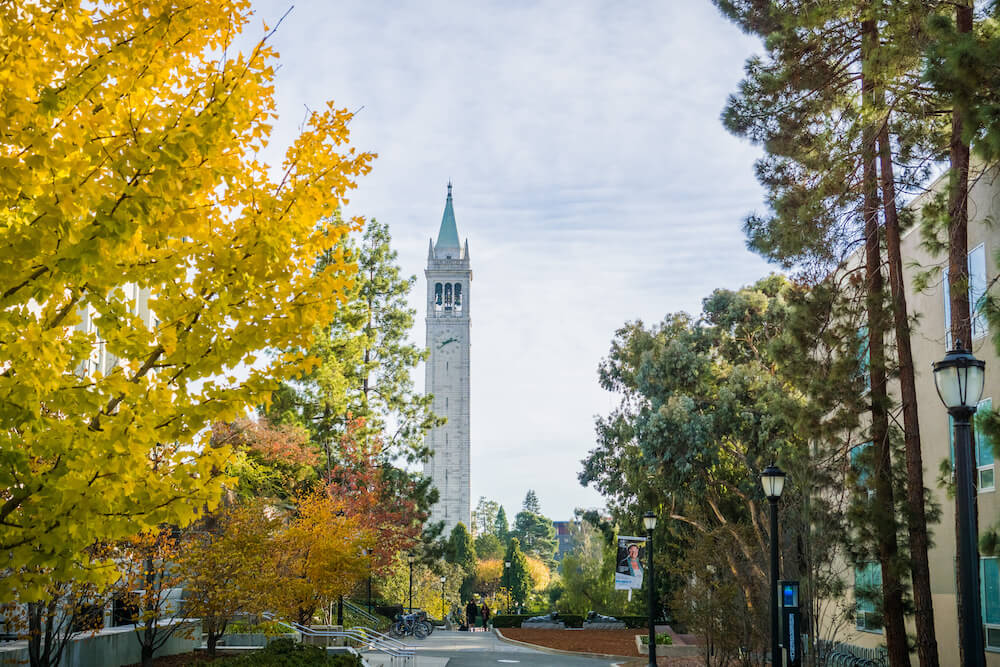Enrollment Freeze Looms at Berkeley
A community group opposes UC Berkeley’s plans for expansion, citing the impact on local neighborhoods. Now, amid an ongoing legal battle, Berkeley may have to cut enrollment by 3,500 incoming students.
Josh Moody | Wednesday, February 16, 2022
A legal battle over campus expansion has forced an enrollment freeze at UC Berkeley as the time to send admissions offers out approaches.
Thousands of prospective students may be denied admission to the University of California, Berkeley, after a judge ordered the institution to freeze enrollment amid an ongoing legal dispute with a local community group over the environmental impact of a proposed expansion plan.
The order to freeze enrollment at UC Berkeley was handed down in August by an Alameda County Superior Court judge in response to a lawsuit brought by a local group called Save Berkeley’s Neighborhoods, which has been organizing around this issue since 2018.
The University of California Board of Regents appealed the decision and asked the court to stay the order to freeze enrollment while the appellate process plays out. That request was denied last week. Now regents are appealing to California’s Supreme Court.
The Legal Background
Following the latest court order, Berkeley must reduce its student population by 3,500 for the next school year. That means sending out at least 5,100 fewer offers of admission for undergraduates entering in the 2022–23 school year, based on projected yield rates, and the loss of $57 million or more in tuition dollars as the university shrinks to comply with the court order.
“If left intact, the court’s unprecedented decision would have a devastating impact on prospective students, university admissions, campus operations, and UC Berkeley’s ability to serve California students by meeting the enrollment targets set by the State of California,” UC Berkeley said in a lengthy statement released Monday that detailed the ongoing legal challenges.
For local homeowners, the judge’s ruling represents a victory in a long-running battle. The group known as Save Berkeley’s Neighborhoods—led by a Berkeley law graduate—has argued that continued enrollment growth at the university has stressed housing availability in the area, displaced existing residents and generated unacceptable levels of noise in nearby communities.
Phil Bokovoy, a Berkeley graduate and president of the neighborhood group that filed the lawsuit, said his alma mater has been irresponsible in managing its enrollment growth, prioritizing higher-paying out-of-state and international students over in-state applicants. The result, he said, has been gentrification as low-income residents are displaced by affluent out-of-state students.
“Landlords are interested in renting to wealthy out-of-state students because their parents cosign the lease,” Bokovoy told Inside Higher Ed. “We have rent control, so if you have turnover every couple of years, you can increase rent every couple of years. Whereas if you rent to a member of the community, they’re going to be there long term, and you’re not going to get the same rental income.”
Bokovoy also accused the UC system of being “arrogant and out of touch” with local communities.
“Our goal is to hold the university accountable for its growth,” Bokovoy said. “And for it to house as many of its students as it can, and to try to preserve what’s left of diversity in Berkeley that has been reduced by the university’s massive enrollment increases.”
Others see the motives of Save Berkeley’s Neighborhoods as less than egalitarian, instead representing a “not-in-my-backyard” mentality. Some believe that using the California Environmental Quality Act to address broader concerns about the community impact of increased enrollment runs counter to the spirit of the law.
“Due to a NIMBY CEQA lawsuit to stop UC Berkeley from expanding to meet growing student need, the University is now forced to rescind 1000s of admission offers,” California state senator Scott Weiner tweeted Monday in reaction to the enrollment freeze. “Let’s be clear: This was never the point of CEQA. This broken status quo must change. Stay tuned.”
The Ongoing Battle
The court found in August that Berkeley’s analysis of the environmental impacts of increased enrollment was flawed and ordered it to keep enrollment at the same level as the 2020–21 school year, which the university noted was down given the coronavirus pandemic. That analysis was conducted as part of the institution’s Upper Hearse Project, a plan that would have added academic spaces and housing for faculty, graduate students and postdoctoral researchers.
Now Berkeley is hoping for legal or legislative intervention as the date to send out admissions offers draws near. The majority of admissions notices for graduate applicants have already gone out, according to a university statement, which means Berkeley will look to shrink its incoming pool of undergraduate students. Though some admissions offers have already been sent, the university statement notes that remaining offers to incoming freshmen will go out March 24 and to transfer students April 2.
UC Berkeley spokesperson Dan Mogulof said the university is conducting a comprehensive analysis to explore all options, seeking to mitigate the impact of shrinking enrollment as the legal battle continues. He also suggested this could have far-reaching implications for other public institutions in California that may face environmental challenges when building new facilities or increasing enrollment.
“Every public college in the state is watching this closely,” Mogulof said.
The order to freeze enrollment at Berkeley comes at a time when the UC system is seeking to expand the number of available seats to meet growing labor force needs in California.
Opponents of Berkeley’s growing enrollment argue the university can still welcome in-state students. In a Monday press release, Save Berkeley’s Neighborhoods said the university “can easily accommodate the court-ordered enrollment cap without harming in-state student prospects by limiting offers to out of state, international, and certificate program students.”
The Fallout
As the deadline to send out admissions offers approaches, observers note that the enrollment freeze puts Berkeley in an unenviable situation deep into an admissions cycle.
“This is a highly unusual circumstance that comes at a busy time during the college admission process,” David Hawkins, chief education and policy officer at the National Association for College Admission Counseling, wrote in an email. “At this point in the admission cycle, colleges and universities are into their application review process, many being close to finalizing their classes for the fall semester.”
And some are questioning why UC Berkeley didn’t make the announcement of a possible enrollment reduction sooner, given the far-reaching impact it has on students who have applied. Christopher Rim, CEO of the admissions firm Command Education, suggests that Berkeley downplayed the enrollment freeze order because it didn’t want to receive fewer applications.
“They want the application fees from out-of-state and international students,” Rim said, adding that keeping applications high and admit rates low would maintain Berkeley’s prestige.
The official response from Berkeley, however, suggests more complicated legal challenges.
“Generally, in CEQA cases, a judgment is stayed at the moment a party files an appeal. As a result, the campus had every reason to believe that the injunction freezing enrollment at 2020 levels had been stayed when the appeal was filed in October,” the university explained in a statement detailing the legal situation and litigation timeline. “However, after UC filed its appeal, UC was advised that the novel enrollment suspension portion of the judgment likely was not stayed by the filing of the appeal, and that, to avoid catastrophic consequences for UC Berkeley’s student enrollment for Fall 2022, UC should seek emergency relief from the court of appeal and ask for a stay of the enrollment injunction while the appeal is being decided.”
Peter Lake, the Charles A. Dana Chair and director of the Center for Excellence in Higher Education Law and Policy at Stetson University College of Law, described the legal situation as unusual and one that will be watched closely.
“It’s a fascinating standoff,” Lake said. “Can a college do what it wants to create the environment it wants or will community impact begin to have to be part of admissions thinking? If we bring in another 1,000 students, will there be a place for them to live where there isn’t this impact on infrastructure? It’s never been a broad legal requirement for admissions committees to think that way. It’s almost as if they’re being pulled into some community-planning dynamic.”
Ultimately, Lake expects the case to end up in the hands of the California Supreme Court.
Originally published on Inside Higher Ed on Feb 16, 2022


